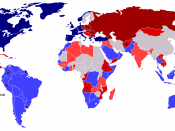The spy who"æ? "ÃÂThe spy who came in from the cold' by John Le Carre, is a novel which bases much of itself around the significance of its title. The importance of this title is the way it encapsulates the entire novel's feeling, emotion, underlying themes and neglected attitudes in one sentence. To fully understand the significance of the title and its encapsulating qualities, key aspects of the novel need to be examined. Definition of the key words in the title, the consistent reference to the hellish atmosphere, the metaphoric meanings of the title; those of emotional cold and unprepared cold, and the aspects that stem from the world of espionage and the cold war.
To grasp the full significance of the title "ÃÂthe spy who came in from the cold' definitions of the key words in it need to be made. The initial word is spy.
A spy is a person employed by a state or institution to obtain secret information from rival countries, organizations etc. The second and foremost to the title is cold. Defined as having relatively little warmth; of a rather low temperature; lacking in affection, enthusiasm or warmth of feeling. In the cold is defined as neglected or ignored. The cold war is defined as, political hostility, sterile war involving propaganda. From these definitions all obtained in the Collins English dictionary, it is also interesting to find the Macquarie thesaurus terms of cold, one such is unprepared. Through identifying these keywords it can now be examined the significance of the title in this new light.
The title lends itself to enable many aspects of the novel to be conveyed; the most obvious of these is cold in the form of temperature and atmosphere. A hellish atmosphere is ever present throughout the novel; this is done by Le Carre with vast references to cold. From the onset of the novel, ideas of cold are observed: "ÃÂLeamas stepped outside into the icy October wind'(Le Carre, 1963, p7) These images of cold occur with great regularity, in the beginning as shown above, to the many times cold is present with Liz and Leamas, to the ending and their release from prison. Although the cold is mentioned many times, colds opposite, heat is also referred to in a less than pleasant way. A fever is when someone's temperature is very high, and thus when Leamas has his fever in the novel it shows that not only is cold harsh but so to is heat. The images of cold and heat occur so regularly throughout the novel that pages could be spent documenting them but in reality only one question is needed, what is their significance to the title? By showing cold and heat in such draconian measures it is demonstrated that something coming in from the cold in the context of the novel is that it is not necessarily to a hot place, and therefore gives glimpses of the ending that takes place, as death is not, in a real sense, hot. The significance of the title is also shown as it in one sentence encapsulates the scene and atmosphere that is to be presented to the reader in the novel.
There are many metaphoric meanings of the title; one of these is the emotional cold that is displayed in the novel. From the already defined meanings of cold, one is lacking in affection, enthusiasm or warmth of feeling. All these traits are conveyed in the main character Leamas. An example is just after Liz and Leamas become lovers: "ÃÂ"æshe was so proud and he seemed so ashamed'(Le Carre, 1963, p36) This is an excellent example of how Leamas throughout the entire novel has very little enthusiasm, affection or warmth of feeling. It is also interesting that at the time of writing the novel Le Carre himself was very emotionally cold: "ÃÂI know that I was deeply unhappy in my professional and personal life, and that I was enduring the extremes of loneliness and personal confusion.'(the Australian, July 1, 1990, Le Carre).
Through these words of Le Carre, it shows that some aspects of Leamas came from his feelings at the time. This shows that the title is significant not only in the context of the novel, but to Le Carre himself, for the title encapsulates some of the cold feelings Le Carre felt when he wrote it and conveys them to the reader.
The cold of emotion is further present in many other aspects of the novel. There is not only Leamas that this emotional cold is seen in, there is also, Mundt, and minor characters like the judge in the tribunal: "ÃÂ..and looking at Fiedler with his hard, cold eyes, wide open'(Le Carre, 1963, p175) Through observing this emotional cold, the significance of the title is seen. In the end Leamas has a change for he goes back down to the other side of the wall and lets himself get shot. In doing this it is observed that he has changed from in the beginning: "ÃÂ..as one day he would meet death, with cynical resentment and the courage of a solitary.'(Le Carre, 1963, p13) From this excerpt in the beginning Leamas changes through his relationship with Liz, and does not die as he says he will but with emotion and warmth of feeling to another. Thus he has "ÃÂcome in' from the emotional cold. Showing the title to encapsulate what is to happen in the end of the novel.
When someone goes into something unprepared it is often said they go into it cold, this can be said of Leamas in "ÃÂthe spy who came in from the cold'. Leamas goes into the operation thinking his purpose is to eliminate Mundt, when in fact he is helping to eliminate Fiedler, thus Leamas goes into the operation very cold. The significance of the title is it tells the reader what is to unfold, for Leamas to "ÃÂcome in from the cold' he must find out the truth of his operation, and he does: "ÃÂWe are witnessing the lousy end to a filthy, lousy operation to save Mundt's skin'(Le Carre, 1963, p209) From this excerpt it is seen that Leamas finds out what the operation is really about, and he comes in from the cold. The title has encapsulated what is to happen in the entire novel.
The title makes reference to cold, and as it is set in the cold war it must be examined as an aspect to come in from. The cold war was a time of great political hostility and was in essence a game, of power and manipulation: "ÃÂ"æof the white demarcation which lay across the road like the base line of a tennis court'(Le Carre, 1963, p6) This excerpt uses tennis to show the reader that a game is to be played in the novel, and it is a game a lot similar to the one of the cold war, power and manipulation. Showing the significance the title has in the light of the cold war is that Leamas comes in from these games of power and manipulation, to a freedom, to a nihilist view and towards the love shown to him by Liz Gold. The title has encapsulated the entire shift of Leamas throughout the novel from a man of the cold war to a man yearning for love and freedom from power and manipulation.
Le Carre uses the title as his encapsulating weapon to show the reader what is to come in the pages of the novel. As the title states there is a "ÃÂcoming in', from the hellish atmosphere but not to a warm place, from the emotional cold to a sacrificing lover, from being unprepared to finding out the ghastly scheme, and from the game of the cold war to freedom from the world of espionage. Using the title as the summary of all summaries an insight into the entire novel is observed, and thus makes its significance absolutely ineffable!





